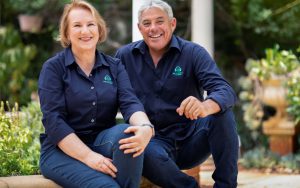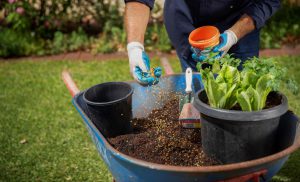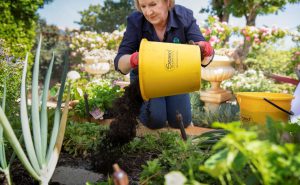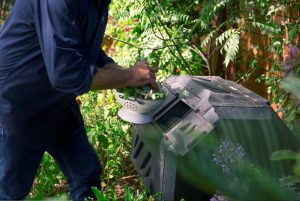All the dirt on home gardening success | Homegrown Goodness
Deryn Thorpe and Steve Wood present the popular gardening podcast, All The Dirt, and share some of their experience and helpful tips of the trade.
A Perth gardener and an award-winning garden journalist, Deryn is passionate about creating beautiful and healthy home gardens.
Steve is an Australian horticulturalist and talkback radio and gardening TV presenter with over 40 years’ experience in wholesale nursery production. He has a special interest in showing people how easy it is to grow food at home.
A growing passion for gardening
How and when did your passion for gardening start?

Deryn Thorpe and Steve Wood, presenters of the podcast ‘All The Dirt’.
Deryn: My mother had a lovely garden, all grown from cuttings from friends’ gardens, but I didn’t really start gardening until my twenties when I bought my first home and wanted to create a beautiful outdoor space. I found working outside and planting flowers and food very rewarding and I quickly became obsessed.
Steve: My passion for gardening started at 6 years old when helping my grandfather prune his grapevine. He gave me a cutting which I took home and planted and that spring it grew and fruited. I still have that grapevine.
Most and least favourite produce to grow?
Deryn: I love things that are easy to grow, and my favourite is probably broccoli, as it thrives during the cooler months, and is very productive and delicious. While I also love asparagus, it’s a long-term crop that needs rich soil to perform well.
I planted it in a garden bed but the roots of nearby trees, seeking out moisture and nutrients, have invaded the space. This has meant that the asparagus has not done at all well and I’ll have to dig it up and put it in a spot that the tree roots can’t reach. A bathtub or wicking bed is a great spot for asparagus.
Steve: My favourite produce to grow is avocados – such a wonderful and versatile fruit. I truly do not have a least favourite; I just love growing any food you can eat.
Advice and tips for novice gardeners
How should a novice gardener get started?
Deryn: Good soil! If you have sand, you need to improve it by adding clay to the top 30cm and all soils need improving with compost before anything is planted.
Steve: A novice gardener should start with lettuce. Super easy to grow, and when watered with a seaweed tonic, it provides the plant with over 40 different vital elements, including iodine, making it especially healthy for children with developing brains.

Steve mixing three key soil improvement ingredients.
What’s a gardening hack you can share?
Deryn: Feed edible plants with a brown liquid fertiliser like PowerFeed or Charlie Carp every week and watch them thrive.
Steve: Coir or coco peat, a by-product from coconut production, is an absolute must for gardeners raising seeds or growing from cuttings. You buy it in dehydrated blocks and soak it in water to prepare it for use. It’s cheap and a wonderful, clean, natural product.
What’s the most common gardening mistake you see being made?
Deryn: People put plants into unimproved soil. We say, ‘don’t put a $10 plant into a 10-cent hole’. Plants in Perth sands struggle to survive, and even local area natives grow better if the soil is improved with compost. The compost feeds the soil microbes, which break compost down into nutrients for the plants.
Steve: The most common gardening mistake is that people fail to feed their vegetables and herbs sufficiently. Regular weekly liquid feeds with seaweed and fish-based fertilisers and a monthly addition of Blood & Bone is essential for optimum production.
Best homegrown produce to work with and enjoy
What’s an underrated produce you’d like to see more people grow and use?
Deryn: Herbs. These are quite expensive to buy (usually $2 to $4 a bunch), and you can easily grow mint, parsley, rosemary, thyme, lemon grass, garlic chives, oregano, coriander (only grows well in the cooler months) and chives in pots on your balcony or courtyard and pick them as needed.
Steve: An underrated produce that more people should grow at home is sweet potatoes. Plant tip cuttings in spring and harvest magnificent tubers in autumn, but throughout the growing season, harvest the young foliage and lightly steam with an added drizzle of olive oil. The leaves have been scientifically attributed with cancer-fighting properties and taste delicious.
Advice for small gardens and small spaces
What should you focus on planting if you only have a small garden?

Deryn Thorpe shows us how to prepare a garden for producing hearty results.
Deryn: Again, herbs. You can use parsley or chives as a pretty edging to garden beds, rosemary makes a stylish hedge, and thyme is a fragrant, low-ground cover. All herbs can be planted in the garden, except mint. Mint should be confined to a pot.
Steve: If you only have a small garden, plant fresh leafy greens including silverbeet, rocket, English spinach and lettuce.
Indoor plants are very on trend at the moment. What plants do you recommend, and what are your tips for keeping them healthy?
Deryn: My indoor collection is becoming a bit of an addiction. For a taller plant, I like the kentia palm., which is an Australian palm that grows very well inside and has graceful, arching fronds.
My favourite smaller plant is Pothos ‘Marble Queen’ (often known as devil’s ivy), which has heart-shaped, variegated, green and cream foliage that cascades from the pot, though you can also grow it on a pole or trellis.
Most indoor plants are killed by over-watering. Put your finger into the soil and only water if it is dry. A half-strength dose of liquid fertiliser each month also keeps them looking good.
Steve: My favourite indoor plant is the beautiful Phalaenopsis orchid. It flowers profusely indoors for months. Lightly liquid feed them once a month with a product such as PowerFeed, and be careful not to overwater them. If the growing medium feels wet, do not add more water. As a rule, water them once a fortnight in winter and once a week in summer.
Waste not, want not
What do you see discarded from the garden that really should be used?
Deryn: Leaves from deciduous trees. These are fantastic added to the compost, or just heaped onto garden beds where they break down and improve the soil.
Steve: Lawn clippings are a wonderful asset that should really not be removed from the lawn. They should be allowed to drop back onto the lawn and work their way back into the soil. If they are collected and removed from the lawn, mix them with Blood & Bone, about a handful for each catcher-full of clippings and set aside in a pile in a shaded position allowing them to compost. After about six weeks, they can be used as mulch on the garden.
We hear a lot about family trade secrets being passed down through the generations, what’s a Steve and Deryn trademark that you’ll be passing on?
Deryn: Never store your spring onions in the fridge. Once you buy a bunch, use what you need and plant the rest of the bunch in the ground after trimming back the foliage by about half or two-thirds.
They’ll be established in a couple of weeks, and you can either cut the leaves as needed to use in potato salads and sprinkle on fish dishes or leave them to grow. They’ll stay in the ground for a year or more but eventually, the bulb will grow to the size of a leek. At this stage, the bulb is best cooked in a soup or casserole.
Steve: My family’s trade secret: slow-release fertilisers turn any amateur gardener into an overnight expert. All commercial growers use slow-release fertilisers in everything they grow.
Potted plants and established gardens all benefit massively by using these slow-release products and they are far safer for the environment than traditional fast-release forms.
Gardening advice and potato pairing

Adding a mix of kitchen scraps and dry leaves, hay, or grass will make great compost.
Now you know a little more about Deryn and Steve, have a read of their perfect pairs recipe suggestions using potatoes.
You can also always enjoy a taste of homegrown goodness if you embrace gardening at home. Check out our gardening advice for starting your own gardens, composting and cooking with fresh produce at home and also how to make your own compost so that your gardens are kept happy and your garden produces the best home-grown produce.